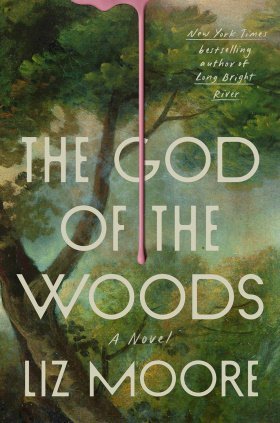Her mother retreats to the other room.
Alone together, Louise and Denny face off.
“Louise,” says Denny. “I gotta ask you two things before I go.”
She waits.
“You know I’m an old friend,” he says. “And I hope you can trust me to do the right thing. I don’t think you’re guilty of anything to do with Barbara Van Laar. And I want to help you get out of the mess you’re in. Do you believe me?”
She keeps her head still. She does and does not trust this man.
Unbothered, Denny proceeds. “First question. Where did John Paul McLellan tell you he was staying this summer?”
“All over the place,” says Louise. “He was visiting friends. He wanted to spend the year traveling before going to law school.”
Denny nods. “What if I told you, instead, that for a large part of this summer he was most likely staying right at the top of Hunt Mountain?”
It takes Louise a moment to process the information.
“I’d believe anything about him now,” she says.
Denny nods. Sympathetic.
“What’s your other question?” Louise asks.
“How well did you know Lee Towson?”
Louise flushes. The name alone brings desire into her body.
“Not well,” she says.
“Were you, y’know. Together?”
“No.”
“You have any idea where he might have gone?”
“No,” she says. In fact, she’s been wondering this too.
“You’re sure.”
“Why?”
“Well,” says Denny. “Normally I’d keep this to myself. But because you’re an old friend, I’ll tell you.”
Louise waits.
“Apparently,” he says, “Barbara was sneaking out of the cabin every night to meet someone she called a boyfriend. You know anything about that?”
She shakes her head. Truthfully, she doesn’t.
“There’s more,” says Denny. “Did you know that Lee Towson was incarcerated once?”
She’d heard a rumor about that. It’s one of the many things that have been said about Lee at Camp Emerson; it only added to his allure. Hesitantly, she nods.
“You know what it was for?”
“Dealing grass?” she says.
“Statutory rape,” says Denny Hayes.
She freezes. She doesn’t know what statutory means.
As if reading her mind, or expression, Denny continues: “Intercourse with a girl sixteen years of age or younger.”
Louise says nothing.
“So you’re sure you don’t know where he is?”
“I’m sure,” says Louise.
“Well, if you think of anything else. Here’s my card.”
She takes it into her hands.
“Guess I’d better head out,” he says. She pictures him going home to his family, his wife and children. She feels suddenly jealous. If she had had a father like Denny Hayes—or a mother, hell—she might have made something more of herself.
“Anything else you want to ask me or tell me?” says Denny.

























